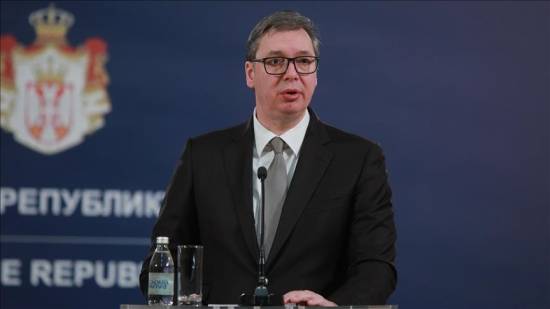Serbia urges constructive EU support on dialogue with Kosovo
Serbia expects the European Union to provide constructive support for dialogue with its neighbor Kosovo to find compromise solutions, said President Aleksandar Vucic on Monday.
The statement followed a meeting in the capital Belgrade between Vucic and European Parliament member Viola von Cramon on the economy, Serbia's European integration, problems in dialogue with Kosovo, the regional situation, and initiatives to connect the Western Balkans.
A statement from the presidential office said Vucic expects constructive support for dialogue and finding compromise solutions, including the application of existing agreements, and above all the Community of Serbian Municipalities, a planned self-governing association of Serb-majority municipalities in Kosovo.
"The conversation is the only right way to resolve open issues, as well as reach a sustainable agreement," said Vucic.
Von Cramon said that respect for the rights of Serbs in Kosovo is in the interest of the European Union and European Parliament.
"In the current difficult geopolitical situation, it is necessary for both sides to be responsible and refrain from provocations," said von Cramon.
Later on Monday Vucic is also set to meet with Oliver Varhelyi, European commissioner for neighborhood and enlargement.
In 2011, the EU initiated a dialogue process to normalize relations between Kosovo and Serbia, but the process was interrupted by tensions over the last few years.
Kosovo, predominantly inhabited by Albanians, broke away from Serbia in 1999 and declared its independence in 2008. Serbia has not recognized this and continues to lay claim to the territory. Kosovo also aims to achieve full EU membership.
Serbia, Russia, and China are among the countries which have yet to recognize Kosovo's independence.
Separately, top diplomats of the EU gathered in Brussels to discuss a number of issues, including the bloc’s support for Western Balkan countries.
The foreign ministers of the Western Balkans countries – Serbia, Montenegro, Kosovo, Albania, North Macedonia, and Bosnia and Herzegovina – joined their EU counterparts for a separate session.
The discussions will focus on how the EU can help its “partners to be more resilient and to deal with the Russian aggression in Ukraine” that heavily affects their economy and security, a senior EU official, speaking on the condition of anonymity, told journalists./aa


